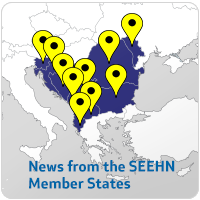This year’s World Mental Health Day, comes at a time of great preassure on our daily lives as a result of the COVID-19 pandemic. Therefore, its celebration on the 10th of October as a tool for global education, awareness and advocacy on mental illness and its major effects on peoples’ lives worldwide is more timely than ever before.
Mental health conditions are highly prevalent and represent one of the leading causes of suffering and disability in the European Region.
Nowadays challenges
The outbreak has further exposed the limitations of our mental health care systems in particular worsening of the existing mental health conditions, triggering new ones, and making access to mental health services even more scarce. The crisis has had a huge psychological impact. Most populations have experienced uncertainty in recent months, when trying to find meaning in rapidly changing events, and being unable to follow the familiar patterns of daily life. With the rise of the burnout among health workers from the frontlines of the pandemic there is an urgent call to confront the mental health fallout of the COVID-19 crisis and to support the resilience of communities experiencing lockdowns.
Therefore, these exceptional circumstances are a timely reminder of the importance of investing in mental health for societies to prosper.

SEEHN & Mental Health
For over a decade, SEEHN has been the undisputed vehicle of health development in the area of mental health in the Region, the thematic area being assumed as of outmost priority on the agenda of the health ministries across the SEE region. The nine SEE ministries of health committed their governments to reform the old psychiatric hospital system to the new community mental health centers aimed to help people live better lives. A dedicated RHDC to mental health was also established in Bosnia and Herzegovina to accelerate change in the region.
A key initiative of the SEE Health Network, recently launched, focus on generating knowledge necessary for health workers to respond rapidly and efficiently to COVID-19 through assessment of the stress and burn out among the healthcare workers during the COVID-19 pandemic.
Strong partnerships
Strong partnerships are needed to improve services and change societal attitudes about mental health, to support new initiatives, including raising awareness. In this sense, much is expected from the new WHO European Programme of Work. SEEHN welcomes that mental health has a central position within it and on behalf of its Member States, strongly supported it at the 70th session of the WHO Regional Committee for Europe.
The inclusion of mental health as one of the flagship initiatives complementing the European Programme of Work, shaping a mental health coalition within the region is an encouraging effort meant to trigger change, and to mobilize around critical issues and for which high-visibility, high-level political commitment can be transformative.





